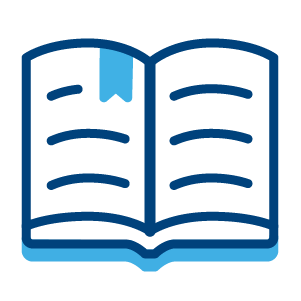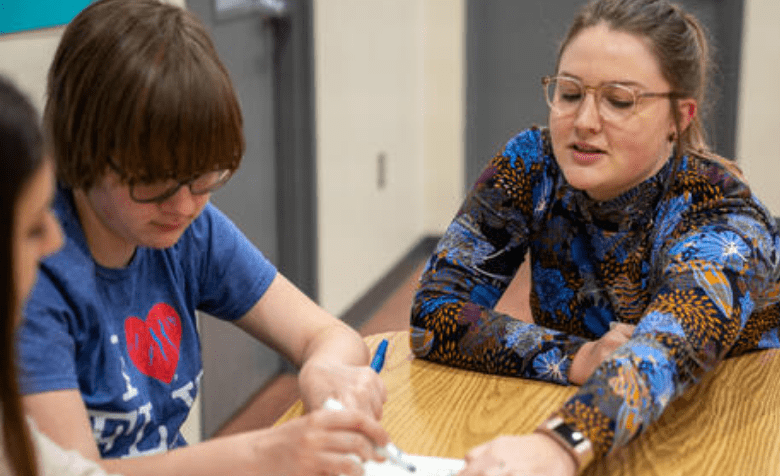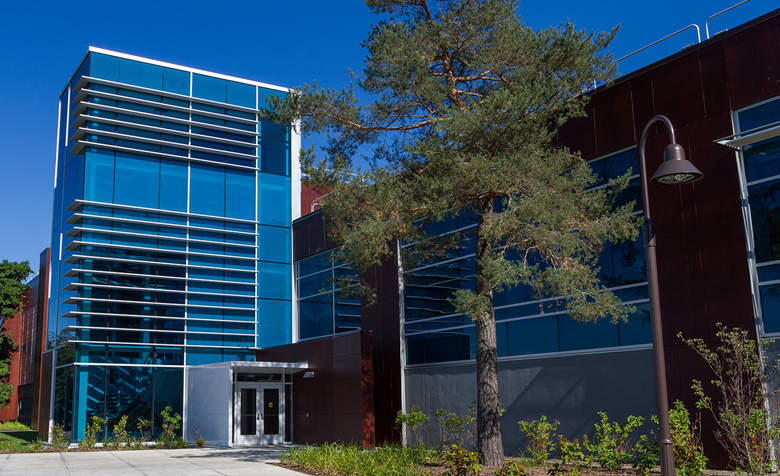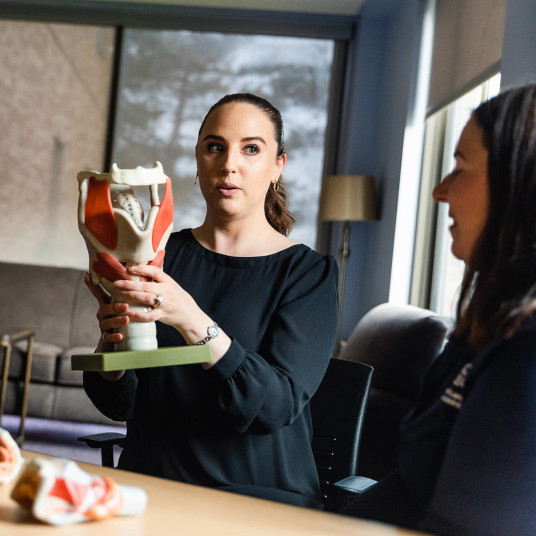At Ithaca College, Students Are Our "Why."
We want Ithaca College to become a model for student success, engagement, and well-being and to help students develop their unique potential. To achieve this goal, we are committed to providing a student-ready campus with programs designed to meet students where they are, and we pledge to promote student success through high-impact experiential learning, integrated study facilitated by strong mentoring relationships, and a holistic focus on student wellness.

Top 100+ SLP Program, #8 in New York
U.S. News & World Report (2025)

#13 Best University in the North
U.S. News & World Report (2026)
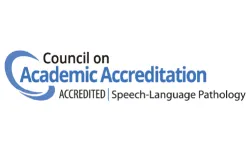
Accredited by the Council on Academic Accreditation of the American Speech-Language-Hearing Association*
5/5 Campus Pride Index
Campus Pride
Ithaca College at a Glance
Ithaca College is a private residential campus where students find life-changing academic pathways, powerful career networks, and lifelong community. Our online program format offers the same rigor and opportunities for connectivity as our on-campus programs and is taught by expert faculty dedicated to student education and growth. Ithaca College is a learning environment all about transformation – the moments you find meaning, purpose, and people.
What began as the Ithaca Conservatory of Music in 1892 has expanded through the years to become much more than a music school. By the 1920s, academic programs expanded to include business, speech therapy, physical education, and the dramatic arts. Today, Ithaca College offers more than 140 majors and minors through its five schools and is comprised of 5,000 students.
Our vision is to be a global destination for bold thinkers seeking to build thriving communities.
Our mission is to educate, engage, and empower through theory, practice, and performance.
Our core values of Academic Excellence, Respect and Accountability, Innovation, Sustainability, Equity are interrelated and equally critical to accomplishing Ithaca College’s vision and mission.
- ACADEMIC EXCELLENCE
Ithaca College views academic excellence as the integration of theory, practice, and performance. The College’s unique fusion of liberal arts and professional programs assumes that knowledge needs to inform and be informed by hands-on experience, real-life application, and concrete action. Curricular and co-curricular activities should allow all community members to develop, debate, and critically evaluate strategies to address complex problems. - RESPECT AND ACCOUNTABILITY
Mutual care, respect, and accountability are expected in all facets of institutional life. Ithaca College values every community member’s dignity and seeks to create a social environment where everyone can flourish and be their authentic self. As members of a thriving community, we demonstrate practices that foster a sense of belonging, shared responsibility, collaboration, innovation, and achievement. Accountability to Ithaca College’s values and policies allows us to consider the consequences of our actions, self-examine, and find ways to restore trust and forgiveness when harm is caused. A culture of care and love grows when we respectfully engage in learning opportunities that help us shift out of our presumed paradigms. - INNOVATION
A culture of innovation enables us to remain forward-thinking, nimble, and adaptable to social and technological change. When people from diverse backgrounds and experiences are empowered to exchange ideas and collaboratively problem-solve, innovation grows, creativity sparks, and institutional and personal goals are achieved. Collaboration between the professional and liberal arts traditions cultivates academic excellence in the spirit of theory, practice, and performance. - SUSTAINABILITY
Adopting institutional strategies that offer ecological and resource-based sustenance to the people and places of Ithaca College ensures its futurity. Sustainability means increasing our usage of renewable energy sources and reducing our carbon footprint because we understand the impact of our decisions on the community and the planet. It means practicing good stewardship of financial resources while fostering connections among students, faculty, staff, alumni, and administrators to serve the public good. We activate critical thinking, scholarly inquiry, professional skills, and performance to positively impact, sustain, and advance our local and global communities. - EQUITY
We adopt an equity framework that proactively seeks to make Ithaca College accessible, affordable, and inclusive for all people, especially those impacted by systemic disadvantage, marginalization, and exclusion. This endeavor requires resource allocation as well as organizational structures that facilitate equity. It demands adopting strategies for increasing the representational diversity of students, faculty, and staff who are currently underrepresented in higher education. It also means implementing inclusive policies and practices proven to foster the retention, belonging, and advancement of people who face systemic disadvantages and discrimination based on race, gender, sexual orientation, religion, ability, and national origin. Finally, an equity framework assumes inclusive decision-making processes, transparency, and accountability as the primary ways of working together.
Ithaca College is accredited by The Middle States Commission on Higher Education (MSCHE).
Ithaca College's Master of Science in Speech-Language Pathology is accredited by the Council on Academic Accreditation of the American Speech-Language-Hearing Association (CAA)*.
*The Master’s of Science (M.S.) education program in speech-language pathology (distance education) at Ithaca College is accredited by the Council on Academic Accreditation in Audiology and Speech-Language Pathology of the American Speech-Language-Hearing Association, 2200 Research Boulevard #310, Rockville, Maryland 20850, 800-498-2071 or 301-296-5700.
Our current accreditation period extends through January 31, 2027.
A copy of our department's vision, mission, and strategic plan is available for review.
For SLP licensure, every state requires a graduate degree and a passing* score on the Praxis Examination in Speech-Language Pathology. Licensure requirements by state can be viewed here.
*Each state determines its passing score for professional licensure and teacher credentialing
Our Top-Ranked* Speech-Language Pathology Program in New York
With over 100 years of excellence in SLP education, Ithaca College offers one of the best speech-language pathology programs in New York, designed to prepare students for successful careers in the field. Students can earn their MS-SLP degree from a number of authorized states with the flexibility of no on-campus requirements, making it ideal for those looking to advance their careers or embark on a new journey.
Join one of New York's top speech-language pathology programs and become part of a community committed to making a difference through innovative research, clinical practice, and outreach. Competitively priced and accredited by the Council on Academic Accreditation of the American Speech-Language-Hearing Association (CAA)**, our program features a comprehensive curriculum and experienced faculty, offering an unparalleled learning experience. Upon graduation, SLP students will be well-equipped with the skills to assess, diagnose, treat, and prevent a wide range of speech, language, and swallowing disorders.
Explore our program and discover why Ithaca College is a top choice for aspiring speech-language pathologists.
*U.S. News & World Report, 2025
**The Master’s of Science (M.S.) education program in speech-language pathology (distance education) at Ithaca College is accredited by the Council on Academic Accreditation in Audiology and Speech-Language Pathology of the American Speech-Language-Hearing Association, 2200 Research Boulevard #310, Rockville, Maryland 20850, 800-498-2071 or 301-296-5700.
Our current accreditation period extends through January 31, 2027.
A copy of our department's vision, mission, and strategic plan is available for review.
Take the First Step
Get Started Now
Get more information so you can make the decision that’s right for you. Learn more about:
- Admission Requirements
- Clinical Placement
- Enrollment Support
- Program Features
FAQs
As you explore the next step in your education journey, we recognize that you’ll have questions along the way. We’re here to help you with answers about Ithaca College, our programs, admission requirements, and more.
Clinical Placement
Our clinical placement services are included with the Master’s in Speech-Language Pathology program. The clinical placements are designed to provide you with real-world, hands-on experience to complement your classroom learning.
Ithaca College FAQs
Ithaca College was founded as the Ithaca Conservatory of Music in 1892. Today, Ithaca College offers more than 140 majors and minors through its five schools and is comprised of 5,000 students.
Ithaca College is accredited by The Middle States Commission on Higher Education (MSCHE).
Yes! Ithaca College has a more than 100-year legacy in SLP education, so you can expect a quality education taught by expert faculty dedicated to student success.
Yes! Every year, Ithaca College and the City of Ithaca are included in assorted lists and “best of” pieces from various publications and outlets. We’re proud this outside recognition helps highlight IC as one of the best colleges in New York state.


